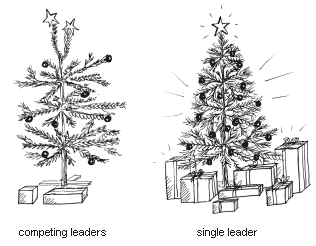As gardeners, we’ve all pinched back young plants to
promote bushier growth. But why does tip pruning have this effect? Many plants exhibit what’s known as apical dominance. One shoot becomes the
"leader," or tallest stem. Surrounding branches seem to magically defer to this
leader, and remain less vigorous. Think of a Christmas tree—the "perfect"
tree (unless you’re Charlie Brown!) has a nice pyramid or cone shape. Once again, the
plant growth regulator auxin is responsible for this phenomenon.
Auxin is present in highest concentrations in the apical,
or uppermost, bud. The presence of this high concentration of auxin has a
growth-inhibiting effect on lower buds and branches. If you remove this apical bud,
however, you remove the source of auxin, freeing the axillary buds (located on the stem
nodes) to sprout and/or lower branches to grow more vigorously.
On plants with two or more leaves or branches per node,
the loss of the apical bud usually results in the "release" of the two (or more)
axillary buds. For example, if the leader on a Christmas tree is damaged, you may find two
or more competing leaders (shoots arising from axillary buds) growing in its place.

On your chrysanthemum plant, each time you pinch back a
shoot, two axillary buds sprout in its place. Pinch back all the shoots and you’ll
end up with twice as many branches, and therefore more sites for flower buds to develop.
|
|

Pinch an inch
Certain annual flowers benefit from pinching back to promote bushiness, including
petunias, impatiens, snapdragons, chrysanthemums, and geraniums. Plants that send up a
single, central flower shoot, such as celosia and stocks, should not be pinched back. |
|